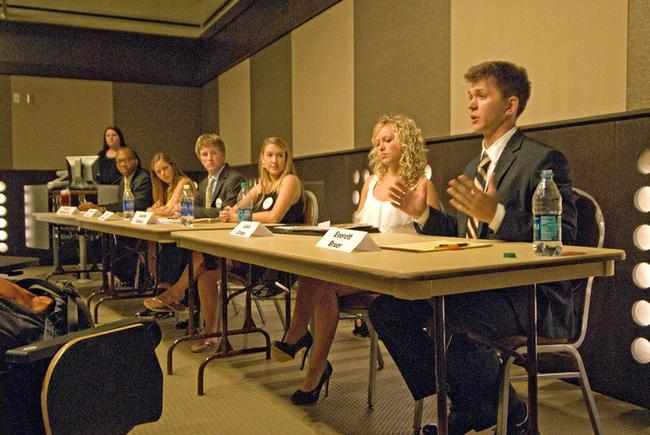
With three weeks remaining until the Missouri Students Association presidential election, candidates gathered together in Chamber Auditorium on Monday night to participate in the first debate of the election season.
Each presidential slate, including Xavier Billingsley and Helena Kooi; Everett Bruer and Lexie Cartee; and Greg Loeffler and Lauren Damico, was present at the debate. The Residence Halls Association hosted the debate to provide each MSA slate the opportunity to talk to students living in residence halls. At the start of the debate, each slate discussed maintaining MSA’s relationship with RHA.
“We’re very committed to having a strong relationship with MSA and RHA,” Billingsley said. “We want to elevate through unity, efficiency and general improvements.”
According to the Board of Election Commissioners handbook, candidates are not allowed to campaign within residence halls. To encourage students to attend the debate, RHA announced it would give an award to the residence hall with the highest percentage of students present.
“RHA, from what I’ve seen, is an awesome organization,” Loeffler said. “I want to continue to work with RHA because they have the connections within the residence halls that are so important to freshmen who are just coming to campus. RHA is definitely that connector.”
During the debate, the slates discussed campus dinning services, campus safety, the One Mizzou initiative, gender-neutral housing, smoking on campus and parking and transportation.
While addressing sustainability through campus dining, each slate discussed their support of the trayless dinning initiative.
“I think it’s important to talk to students about going trayless,” Bruer said. “It’s important to get student voices in on this issue.”
Billingsley said his campaign is exploring long lines during peak hours in dining halls that keep students waiting for extended periods of time.
“One big thing for us is to make sure that student needs are met,” Billingsley said. “I really want to check in to see how we can make campus dining more convenient for students.”
Each slate also voiced its support of the STRIPES safe-ride program. Damico said while further funding should go toward the program, the funds should be used to help the program expand to days when students tend to drink more than usual, such as Halloween, Cinco de Mayo and St. Patrick’s Day.
“Why don’t we increase the availability of STRIPES to heavy drinking days?” Damico said. “Those days don’t always fall on the weekends.”
While discussing campus safety, Bruer and Cartee focused on the safe walk home program. The program would provide an alternative to the blue light emergency phone safety system currently operating on campus by positioning students in certain places on campus to help walk other students home.
“The past safe walk home program was unsuccessful because of a breakdown in leadership,” Bruer said. “After talking to administrators, the truth of the matter is nobody uses (blue lights). Using an actual person instead of machine would be a lot more customer-friendly.”
Billingsley and Kooi said they want to recognize students who work for MU. The recognition would be consistent throughout the year to award students who help MU operate on a daily basis.
“If we didn’t have students working on this campus, we wouldn’t have a campus to actively run,” Billingsley said.
The candidates also discussed how a conference jump from the Big 12 to the Southeastern Conference would impact students.
“I’m not fit to say what’s in the best interest of MU moving from the Big 12 to the SEC,” Billingsley said. “What I can tell you is that our university needs to make sure that it prides itself on its traditions and makes sure that it continues all of those traditions.”
Each slate expressed its willingness to continue working with MSA, even if they do not win the presidency in the November election.
“We’re all friends up here,” Loeffler said.